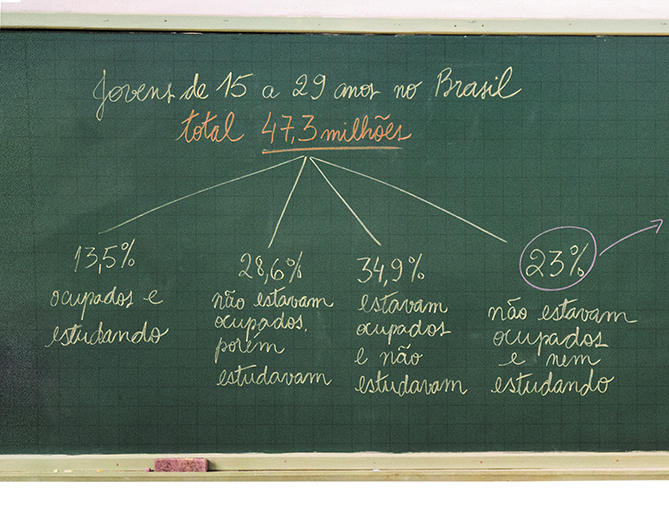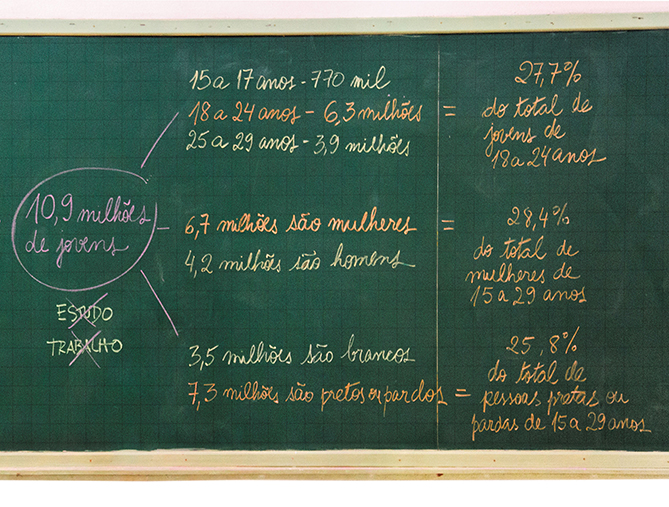Retratos Magazine
In Brazil, nearly 11 million youngsters neither study nor work
October 29, 2019 02h00 PM | Last Updated: October 29, 2019 04h53 PM
In Brazil, almost 11 million young people aged 15 to 29 are neither employed nor studying/training, according to the Continuous Pnad - Education Supplement, conducted by the IBGE in 2018. This group, which represents 23% of the country's population in this age group, became known as "nem-nem", a term that has become controversial and, therefore, has had its use avoided.
The economist of the Institute for Applied Economic Research (Ipea), Joana Costa – one of the authors of the Brazilian chapter of the international research Millennials in Latin America and the Caribbean: working or studying? – explains that the term “nem-nem” is a variation of the acronym Neet (Not in Education, Employment, or Training), which emerged in England, in the 1990s, in the first debates on young people that neither studied nor worked.
But, for Joana, differently from the English acronym which uses more formal and technical terms, the expression in Portuguese ended up getting a negative value, implying that those young people are idle simply because they want to.
“Both the terms in Portuguese (nem-nem) and Spanish (nini) are inadequate because they make it seem as if the problem is the young generation not wanting to study or work. It looks like one blames the young people for their situation, ignoring the obstacles being faced”, claims the economist.


Obstacles to studying and working
IBGE analyst Marina Águas highlights that household chores and people caring are the min barriers faced by youngsters to keep on studying or finding a salaried job. This is especially true for women, the majority in this kind of situation.
“And there is still a lot of prejudice against household chores. As they are not valued as work, it looks like the person who does them is at home idling. However, this activity tends to be very hard on whoever does it ”, she says. “Imagine yourself having to clean up the house, cook the family's meals, pack your husband's lunch for work, take care of the children... List all of it on paper and try to figure out the wages you would have to earn to pay for another person to do those exact chores for you and, in the end of the day, make it also worth getting into the labor market”.
Such is the very case of Luiza Perminio, 27 years old. Nearly two years ago, an unplanned pregnancy made her drop out of college and, since her son was born, she has been totally dedicated to her child and home. Luiza explains that she would need daycare services and a baby sitter in order to return to school or get a job. “I would work just to say I am working, since I would basically pay to work. And the person I would hire would not do things the way I do”, she emphasizes.
Expectations for the future
Economist Joana Costa states that the desire to go back to school or work, as well as the feeling they are not going to make it, surround most of those youngsters – not only in Brazil, but also in the other countries analyzed in the research she took part in. “They have low expectations compared to the other young people, for they believe they have less power over their lives and less ability to solve problems and reach their long-run objectives”, she explains.
According to Joana, it is not possible to decide whether the situation of these youngsters is either a cause or a consequence of low expectations. For the economist, however, this is not the crucial point. “Whatever the reason, it can be a barrier preventing young people from getting out of this condition. Therefore, educational policies have to be thought of to help them overcome this situation”, she claims.
See the complete article in the Retratos Magazine no. 18.
_______________________________________________________________________
This is the last Retratos issue, since the magazine will no longer be published by the IBGE due to the measures of rationalization and expense reduction, adopted by the institution.
From May 2017 to October 2019, the Retratos magazine, along its 18 editions, addressed current themes related to the IBGE’s mission of portraying Brazil by providing the information required to the exercise of citizenship.
To check out all the Retratos issues, click here.



















